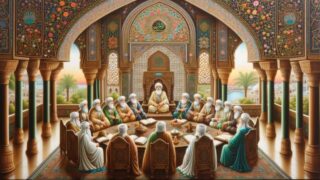An Italian summer controversy opens a window on how politeness and high ideals can be proposed to young women and men.
by Daniela Bovolenta*
*A paper presented at the webinar “Who Stole Their Youth? Protests, Freedom, and the Tai Ji Men Case,” co-organized by CESNUR and Human Rights Without Frontiers on August 8, 2023, in preparation of the United Nations International Youth Day, August 12.


In Italy we say that every summer we have a “tormentone.” This as an expression meaning literally “a great torment” but is in fact impossible to translate. It indicates a discussion going on for days and days about something that, perhaps, is not so urgent and important but occupies the otherwise lazy afternoons of Italians on the beach.
This year, it is about an article entitled “On the Train to Foggia with Young Lansquenets,” published in “Repubblica,” Italy’s second daily newspaper by circulation, on July 23 by Alain Elkann. The author is a 73-year-old Italian journalist, who happens to be the father of John Elkann, the chairperson and majority shareholder of Italy’s largest industrial conglomerate, which controls the Fiat Chrysler automotive group and dozens of other companies, including the daily newspaper “Repubblica” on which the article appeared.
In the article, the older Elkann told the story of how he boarded a business class carriage of a train going to the southern Italian city of Foggia, and found himself surrounded by teenagers. Presumably they were from well-off families since they could afford the business class ticket. Elkann described himself with his custom-made linen suit trying to take handwritten notes with his expensive fountain pen while reading the “Financial Times” in English and a volume of French writer’s Marcel Proust “In Search of Lost Time,” obviously in its original French. But he was mightily disturbed by badly dressed teenagers that seemed interested only in soccer and girls. Elkann compared them to the dreaded lansquenets, the crude Renaissance German mercenaries who came to Italy and destroyed entire cities and countless works of art without even understanding what they were all about.


The article generated hundreds of answers, some humorous and some indignant. “Repubblica” journalists staged a protest claiming the article had not been approved by the editorial board and had been published only because the author was the father of the newspaper’s owner. Some reminded Elkann that he also has a younger son who has had serious drug addiction problems. Ryanair issued an advertisement imagining Elkann seated in one of its noisy but happy low-cost flights.
It is unclear to me whether the story was, in the first place, true. Elkann claimed that the boys used the expression “Let’s go look for girls in nightclubs,” which has been out of use for at least forty years among teenagers who would mention discos but certainly not “nightclubs.”
The debate was, however, in its own way serious. Some considered the author an outmoded elitist, full of himself and his own privileges. Others saw in Elkann someone who was finally brave enough to say what many happened to think, namely that social relations have increasingly deteriorated and good manners have vanished. For the latter, the old journalist had become the bearer of a few crumbs of style, culture, elegance, all legacies of a better time.
Both positions have a part of truth. On the one hand, I was left with the impression that Elkann was worse than the boys he called “lansquenets.” He was snooty, irritated because the rest of humanity also got on his train, stricken in pride for not being greeted but more importantly, for not being recognized. After all, the boys did not do anything illegal or criminal, in a country where on some train routes women, men, and even railways employees are routinely harassed and assaulted by drug addicts and aggressive beggars or immigrants who travel without a ticket.
I was tempted to say that all my sympathy went to the kids. But that might have been a mistake, and I wondered whether perhaps we have become so used to bad customs that they seem normal to us. I have considered the question, and the answer is no. That is not the point of the incident. The point is that goodness, civility, politeness, are not empty shells that stand on their own. They are the fruit of a worldview, of a hope for the future, of lives rooted on conscience. How could a world that proposes to those young people nothing but the immediate satisfaction of every instinct, extreme individualism, and consumerism, the wiping out of every legacy of the past in the contemporary “cancel culture,” no greatness, either human or divine, expect them to shape themselves from the outside and to cultivate a horizon of fountain pens, linen suits, formal politeness, and a love for the French classics?


One can ask whether the ultra-liberal, permissive culture advocated by Elkann himself and the newspaper “Repubblica” is somewhat responsible for this state of affairs. But the question is much broader. In Europe, those forms of politeness and elegance whose disappearance among the youth Elkann regrets were forged throughout the centuries by monks and scholars who knew their Latin and Greek classics and were at the same time inspired by the values of Christianity.
I cannot but compare Elkann’s “lansquenets,” from whom perhaps some politeness was stolen by a society without values, spirituality, or hope, with the Tai Ji Men young dizi described in the book “Who Stole Their Youth?” I am sure that the young Tai Ji Men dizi are normal young men and women, interested in music, sport, and romantic relationships as are all young people around the world. Yet, as the book explains, they were willing to devote for years most of their spare time to educate themselves on tax and law reform issues and protest in the streets advocating for justice in the Tai Ji Men case.


Are they different from other young people? Yes and no. They did what they did not only because they and their relatives experienced injustice but because they had been educated by Tai Ji Men and their leader Dr. Hong to rely on conscience as the moral compass for all their actions.
But everybody has a conscience, although not all realize it. Like everyone else, I too have had moments of irritation at the rudeness of young people around me, and yet I wonder if it is not necessary to look at these boys with other eyes, to see the good in them, to promise them horizons of meaning and spirituality, to consider that they too have a conscience that can be awakened. From this awakening, I am sure, would also spring more courteous forms, more urbane manners, more calm tones.
The Tai Ji Men youth offers a good example that, when high ideals are proposed to young people, they resonate in their conscience, and many respond positively. It is impossible, on the other hand, to deceive young people by demanding that they adopt outward forms that are now meaningless to them, perhaps for the sake of some old snob who would like to travel by train without the entanglements of the rest of humanity.









